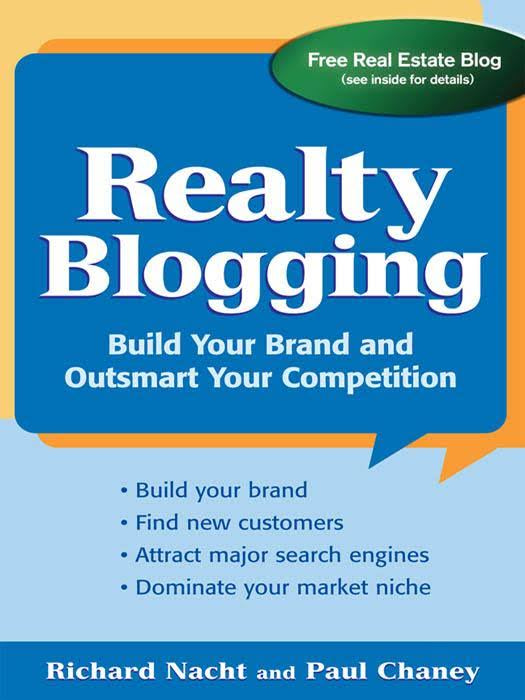Realty Blogging by Richard Nacht and Paul Chaney

Realty Blogging: A Comprehensive Review and Guide
The corporate blogging landscape is flourishing, and niche instructional books are blooming alongside it. “Realty Blogging” by Richard Nacht and Paul Chaney stands out as a gem, not just for real estate professionals, but for anyone navigating the world of corporate blogging.
This review delves into the book’s strengths, explores its universal applications, and suggests additional considerations for crafting a comprehensive blogging strategy.

Beyond Niche: Universal Benefits of Realty Blogging
While “Realty Blogging” caters directly to realtors, its core message resonates across industries. The book champions the power of blogging to build brand awareness, increase consumer engagement, and ultimately drive sales – all essential objectives for a successful blog.
Strategic Tool for Success: Leveraging Technology in Real Estate
The opening chapter dives deep into the strategic advantages a blog offers realtors. Nacht and Chaney highlight the immense potential of this medium when leveraged effectively.
They explore the ever-evolving role of technology in the realty sector and emphasize the importance of embracing these changes before competitors.
This section goes beyond basic blog mechanics and positions blogging as a strategic tool for staying ahead of the curve in a dynamic industry.
Building Your Audience: SEO, Targeting, and Communication
Subsequent chapters tackle search engine marketing (SEM) and the art of fostering direct communication with your audience. These elements are crucial for attracting and retaining readers, regardless of the blog’s niche. The authors provide valuable insights on:
- Keyword Targeting: Techniques for selecting relevant keywords to optimize blog posts for search engines, ensuring your content reaches the right audience.
- Research Techniques: Strategies for conducting effective research to enhance audience reach and niche development.
- Communication: Nacht and Chaney emphasize the critical distinction between simply writing a blog and actively utilizing it to cultivate relationships. They address the common pitfall of neglecting reader correspondence and offer practical guidance on building a strong communication strategy.
Brand Building and Beyond: Powerful Tools for All Bloggers
Chapter four, dedicated to brand building through blogging, deserves multiple readings. It goes beyond the basics of brand awareness and offers practical guidance on:
- Word-of-Mouth Marketing: Leveraging the power of positive reader experiences to generate organic brand promotion.
- Recruitment: A topic rarely explored in other blogging resources, Nacht and Chaney offer insights on utilizing a corporate blog for recruitment purposes.
Expertise, Relationships, and Lead Generation: Building a Strong Foundation
Chapters six and seven delve into establishing yourself as a trusted expert and leveraging this expertise to build strong relationships through relationship marketing. The book provides a comprehensive exploration of both subjects, surpassing the depth typically found in similar resources.
Chapter ten shines as another highlight. It equips readers with exceptional advice on crafting blog posts specifically for lead generation. This often-ignored topic holds immense value for any blogger or manager seeking innovative lead acquisition strategies.
Universal Applicability: A Boon for All Bloggers
“Realty Blogging” is a strong recommendation for anyone interested in corporate blogging, particularly those focused on generating leads, boosting sales, and increasing revenue. While the book targets realtors, its insightful advice on lead generation transcends industry boundaries and can be effectively applied by bloggers of all stripes.
A Rare Gem: Beyond Niche Excellence
This book stands out as an exceptional resource for the realty niche, yet its value extends far beyond. Its universal applicability and insightful content make it a valuable tool for anyone involved in corporate blogging.
Building a Comprehensive Strategy
While the review highlights the core strengths of “Realty Blogging,” let’s explore some additional considerations for building a comprehensive blogging strategy:
Content Strategy and Consistency: The book emphasizes keyword targeting and communication, but a successful blog requires a well-defined content strategy. Some potential areas for further exploration include:
- Developing a Content Calendar: Planning your content in advance ensures a consistent flow of engaging content and avoids last-minute scrambling.
- Crafting Engaging Headlines: Headlines are the first impression your content makes. The book could have offered more guidance on writing headlines that grab attention and entice readers to click.
- Optimizing Content for Various Formats: Consider incorporating different content types like listicles, infographics, and videos to keep your audience engaged.
- Maintaining Consistent Posting: Regularly publishing fresh content is crucial. The book could have benefited from additional guidance on establishing a sustainable publishing schedule.
Social Media Integration: While the book touches on building brand awareness, a more in-depth exploration of social media integration would have been beneficial. Here are some key points to consider:
- Promoting Your Blog Content: Utilize social media platforms to share your blog posts, engage with your audience, and drive traffic back to your website.
- Building Communities: Social media platforms provide opportunities for fostering connections, building communities around your brand, and establishing yourself as a thought leader.
Data Analytics and Measurement: Understanding your audience and the effectiveness of your content marketing efforts is vital for success. While “Realty Blogging” doesn’t delve into this area, here are some important considerations:
- Employing Analytics Tools: Utilize website analytics tools like Google Analytics to track key metrics such as website traffic, visitor demographics, and content engagement.
- Analyzing Data and Making Adjustments: By analyzing data, you can identify what content resonates with your audience and what needs improvement. This allows you to refine your content strategy and maximize engagement.
Visual Content: The power of visual storytelling is undeniable. Here are some ways to leverage visuals in your blog:
- Strategic Use of Images: High-quality, relevant images can enhance understanding, improve user experience, and break up text-heavy content.
- Infographics: Complex information can be presented in a clear and engaging way using infographics.
- Videos: Video content is highly engaging and can be used for tutorials, interviews, or showcasing properties (in the case of real estate blogs).
Additional Considerations:
- Mobile Optimization: With the increasing use of mobile devices, ensuring your blog is mobile-friendly is crucial.
- Building an Email List: Building an email list allows you to nurture leads, share updates, and drive traffic back to your blog.
- Engaging with Comments: Respond to comments on your blog to foster a sense of community and demonstrate that you value your readers’ input.
- Staying Up-to-Date with Trends: The digital landscape constantly evolves. Staying informed about the latest trends in SEO, content marketing, and social media is essential for maintaining a successful blog.
Final Word:
“Realty Blogging” by Richard Nacht and Paul Chaney is a valuable resource for anyone venturing into the world of corporate blogging. Its core principles transcend the realty niche and offer a wealth of universal wisdom.
By incorporating the considerations outlined in this review, readers can leverage the book’s insights to establish a comprehensive blogging strategy with the potential to significantly enhance brand awareness, lead generation, and overall online presence.
While the book primarily focuses on content creation and communication, it’s important to remember that blogging is just one piece of the digital marketing puzzle. Consider integrating your blog with other marketing efforts, such as social media campaigns, email marketing initiatives, and even paid advertising, to maximize your reach and impact.
Overall, “Realty Blogging” is a strong starting point for anyone looking to build a successful corporate blog. By combining the book’s valuable lessons with a well-rounded digital marketing strategy, you can effectively leverage the power of blogging to achieve your business goals.














To anyone involved in the real estate market, you will probably need to start studying up on real estate blogging. I think this is the wave of the future and those who don’t keep informed could very easily get passed by.
Wow. Thanks for the review. You are absolutely correct in your assertion that the book has relevance for a number of industries, not just real estate. The book, in its originally proposed form, was not RE specific, but the publisher, McGraw-Hill, expressed particular interest in one targeting Realtors. So, we obliged.
If it were feasible to do so, the book could be replicated to apply to any number of verticals and it would be my hope that those outside real estate would take a chance on it.
Again, thanks for the great review. I know I speak for Richard as well when I say we greatly appreciate it.